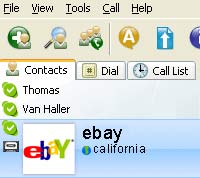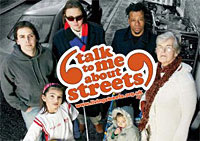 Rumours hotter than a double strength vindaloo are circulating major news organisations like the Wall Street Journal, Reuters and the Web that online auctioneers eBay are in talks to acquire the Internet-telephony company Skype.
Rumours hotter than a double strength vindaloo are circulating major news organisations like the Wall Street Journal, Reuters and the Web that online auctioneers eBay are in talks to acquire the Internet-telephony company Skype.
The Wall Street Journal is reporting the world’s largest online auction site could be heading for a major shift in strategy in a deal involving truly stratospheric figures of $2 billion to $3 billion. If you think that’s high, the New York Post are quoting $5 Bn as the price.
The paper reports that the talks are in a “sensitive stage” and – mindful of Skype’s earlier failures to close deals with other technology companies – could “fall apart” at any given moment.
(Simon Perry – The very fact that eBay could be getting around the table with Skype either reflects the company’s quest for new product categories and international markets, or they could integrate Skype into the service, offering purchaser and seller to talk to each other. Another option could be to use Skype’s ability to host group discussions as a way of strengthening communities with the same interests.
Although they still rule the roost for online auctions, their core business is maturing, leading the company to diversify into new markets such as rental-property listings, online classified-ad listings and comparison shopping.
Despite other online leaders such as Yahoo and Google ramping up the feature set and expanding into new territories, eBay has remained focussed on the task of acting as middleman between individual buyers and sellers. 
Their acquisition of the electronic-payment processing service PayPal in 2002 echoed their aim to simplify the business of buying and selling goods online, and an integrated VoIP service could provide a key element of that strategy.
Such a deal would also massively increase Skype’s presence, with eBay’s huge user base of 157 million technology-literate subscribers likely to be keen to adopt.)
Although market leader Skype currently enjoys huge popularity, their Big Cheese position is coming under considerable pressure as Google (Google Talk) and Microsoft (after recent Teleo VoIP purchase) tool up with their own VoIP offerings.
Optimistically, we gave Skype a call for their opinion (on Skype naturally) and got the expected, “Skype doesn’t comment on rumours” answer.
The ‘Skype for sale’ rumours are unlikely to go away after it was recently reported that they had hired investment banking firm Morgan Stanley & Co. to examine their options – including floating an IPO.
Back then Skype flatly denied that the company was for sale. Today, they didn’t confirm or deny this.
As Apple know, this is the best way to get written about, isn’t it?
We’ll see.
 Real Networks is looking to up-end Apple’s iTunes store and nobble Napster To Go by launching a new music subscription services for portables music players.
Real Networks is looking to up-end Apple’s iTunes store and nobble Napster To Go by launching a new music subscription services for portables music players. Rhapsody 25 is the entry-level standard service which is completely free to use. It’s being supported by advertising, initially Chrysler and is designed to tempt people to subscribe. It allows anyone who downloads Rhapsody’s Windows-based jukebox software to listen to 25 songs for free each month from Rhapsody’s library, with the option to purchase and download songs a la carte. There will also be 25 ad-free radio stations available.
Rhapsody 25 is the entry-level standard service which is completely free to use. It’s being supported by advertising, initially Chrysler and is designed to tempt people to subscribe. It allows anyone who downloads Rhapsody’s Windows-based jukebox software to listen to 25 songs for free each month from Rhapsody’s library, with the option to purchase and download songs a la carte. There will also be 25 ad-free radio stations available. It’s been likened to having your CD collection on permanent hire purchase – once you lapse on your payments, you can kiss goodbye to your tunes. To old-school music fans, not owning your precious sounds is a bonkers proposition, but both Real and Napster believe there’s a market for subscription-based music downloads, with punters excited by the promise of filling an entire iPod for less than the price of two CDs.
It’s been likened to having your CD collection on permanent hire purchase – once you lapse on your payments, you can kiss goodbye to your tunes. To old-school music fans, not owning your precious sounds is a bonkers proposition, but both Real and Napster believe there’s a market for subscription-based music downloads, with punters excited by the promise of filling an entire iPod for less than the price of two CDs. A coalition of government policy makers, technology and broadband companies from China have rocked up to the NAB2005 Media Show in Las Vegas.
A coalition of government policy makers, technology and broadband companies from China have rocked up to the NAB2005 Media Show in Las Vegas. Video Networks Limited (VNL), who operate the HomeChoice VOD service around London, have added the children’s animation channel Toonami to their line up using the MPEG-4 / AVC format, making it the world’s first television channel to be encoded with advanced compression technology.
Video Networks Limited (VNL), who operate the HomeChoice VOD service around London, have added the children’s animation channel Toonami to their line up using the MPEG-4 / AVC format, making it the world’s first television channel to be encoded with advanced compression technology. VNL’s migration to MPEG-4 for its remaining broadcast channels, including the Cartoon Network and Boomerang, is expected to be completed within the next two months. In time the VOD service will also be moved to the new CoDec.
VNL’s migration to MPEG-4 for its remaining broadcast channels, including the Cartoon Network and Boomerang, is expected to be completed within the next two months. In time the VOD service will also be moved to the new CoDec. “The first commercially available encoding platform to support MPEG-2, MPEG-4/AVC and SMPTE VC-1, Harmonic’s DiviCom MV 100 enabled VNL to provision a compelling video-over-DSL service while in parallel developing the elements of an MPEG-4 environment.
“The first commercially available encoding platform to support MPEG-2, MPEG-4/AVC and SMPTE VC-1, Harmonic’s DiviCom MV 100 enabled VNL to provision a compelling video-over-DSL service while in parallel developing the elements of an MPEG-4 environment. There has been much rumblings of discontent from content suppliers to the mobile phone industry, and, as the globally dominant brand, Vodafone have been taking a lot of the flack.
There has been much rumblings of discontent from content suppliers to the mobile phone industry, and, as the globally dominant brand, Vodafone have been taking a lot of the flack. Feeling the pressure, Vodafone have tried to placate their grumbling partners in the short term by dishing out a sizzling barbeque of buzzwords, liberally doused with PR doublespeak.
Feeling the pressure, Vodafone have tried to placate their grumbling partners in the short term by dishing out a sizzling barbeque of buzzwords, liberally doused with PR doublespeak. It looks like Tim Harrison, Head of Games at Vodafone Group Services, had been smoking pure Moroccan Buzzword when he came out with this piece of baffling industry-speak: “Having pre-agreed, pan-regional marketing and distribution capacity will allow us to run multi-territory co-marketing more easily, improve efficiencies for our partners and benefit the industry as a whole.”
It looks like Tim Harrison, Head of Games at Vodafone Group Services, had been smoking pure Moroccan Buzzword when he came out with this piece of baffling industry-speak: “Having pre-agreed, pan-regional marketing and distribution capacity will allow us to run multi-territory co-marketing more easily, improve efficiencies for our partners and benefit the industry as a whole.” Living Streets, a national charity, launched its election campaign, “Talk to me about streets”, by making street items like paving and signs talk back to passers-by in Meard Street, Soho, London.
Living Streets, a national charity, launched its election campaign, “Talk to me about streets”, by making street items like paving and signs talk back to passers-by in Meard Street, Soho, London. Paving ‘squealed’ underfoot to point out the dangers of tripping over broken paving while spooky whispering windows resonated with the sound of absent children, no longer able to play in our dangerous streets.
Paving ‘squealed’ underfoot to point out the dangers of tripping over broken paving while spooky whispering windows resonated with the sound of absent children, no longer able to play in our dangerous streets. Living Streets Director Tom Franklin explains, “The streets are the one public service that everyone uses. Politicians can directly improve people’s daily lives by improving the street environment.”
Living Streets Director Tom Franklin explains, “The streets are the one public service that everyone uses. Politicians can directly improve people’s daily lives by improving the street environment.” Verity Parker, who is doing an PhD at Brunel investigating electrical conductive fabrics, worked with Stock Displays to produce talking street signs, labelled in standard UK form, but with short audio samples.
Verity Parker, who is doing an PhD at Brunel investigating electrical conductive fabrics, worked with Stock Displays to produce talking street signs, labelled in standard UK form, but with short audio samples. ‘The street that talks’ has the support of the Royal National Institute of the Blind, (RNIB) which also campaigns for streets and the built environment to be more accessible to blind and partially sighted people.
‘The street that talks’ has the support of the Royal National Institute of the Blind, (RNIB) which also campaigns for streets and the built environment to be more accessible to blind and partially sighted people. An accompanying new Living Streets’ pamphlet – written by two of Britain’s most eminent architects, Lord Richard Rogers and Sir Terry Farrell – was also unveiled at the event.
An accompanying new Living Streets’ pamphlet – written by two of Britain’s most eminent architects, Lord Richard Rogers and Sir Terry Farrell – was also unveiled at the event. Pace Micro Technology, a cutting edge UK digital set-top box provider tasked with developing emerging technologies across all television platforms, has trumpeted the launch of a number of STB’s and PVR’s, including the Laguna DC551HD and DC 501 Chicago all-digital set-top box.
Pace Micro Technology, a cutting edge UK digital set-top box provider tasked with developing emerging technologies across all television platforms, has trumpeted the launch of a number of STB’s and PVR’s, including the Laguna DC551HD and DC 501 Chicago all-digital set-top box. Pace is also offering the Tahoe DC775 HD-DVR, claiming it to be the most advanced high definition DVR for North America, and the first cable set-top box to offer features based on next generation silicon. Interestingly it offers a number of ways to save video content to the 160Gb hard drive – Standard Definition (SD), High Def (HD) and enhanced analogue. With multi-room video distribution and support for high-speed data connections for home computers, wireless routers and VoIP included you might be wondering what isn’t included.
Pace is also offering the Tahoe DC775 HD-DVR, claiming it to be the most advanced high definition DVR for North America, and the first cable set-top box to offer features based on next generation silicon. Interestingly it offers a number of ways to save video content to the 160Gb hard drive – Standard Definition (SD), High Def (HD) and enhanced analogue. With multi-room video distribution and support for high-speed data connections for home computers, wireless routers and VoIP included you might be wondering what isn’t included. Pace Americas’ VP of Technology Chris Dinallo had clearly feasted on a diet of buzzwords before adding, “All-digital and digital simulcast are critical industry initiatives, and uniquely, Pace is proud to be the only set-top box provider that can support all-digital on both networks.”
Pace Americas’ VP of Technology Chris Dinallo had clearly feasted on a diet of buzzwords before adding, “All-digital and digital simulcast are critical industry initiatives, and uniquely, Pace is proud to be the only set-top box provider that can support all-digital on both networks.” In a break with cinema-tradition, HDNet Movies viewers will be able to see Alex Gibney’s highly acclaimed documentary “Enron: The Smartest Guys in the Room” on the very same day the movie premieres in US theatres.
In a break with cinema-tradition, HDNet Movies viewers will be able to see Alex Gibney’s highly acclaimed documentary “Enron: The Smartest Guys in the Room” on the very same day the movie premieres in US theatres. The London Underground is to show digital advertising on its escalators for the first time, as part of a trial being handled by Viacom Outdoor.
The London Underground is to show digital advertising on its escalators for the first time, as part of a trial being handled by Viacom Outdoor. The trial is due to start within months, and if successful will be rolled out at other locations across the network.
The trial is due to start within months, and if successful will be rolled out at other locations across the network. Until now, Apple has been pretty safe in its position of master of all digital music players. That’s lead to speculation of their crown slipping. We’re fresh back from the European consumer show CeBIT and saw many, many good looking, highly functioned, portable music players there.
Until now, Apple has been pretty safe in its position of master of all digital music players. That’s lead to speculation of their crown slipping. We’re fresh back from the European consumer show CeBIT and saw many, many good looking, highly functioned, portable music players there.